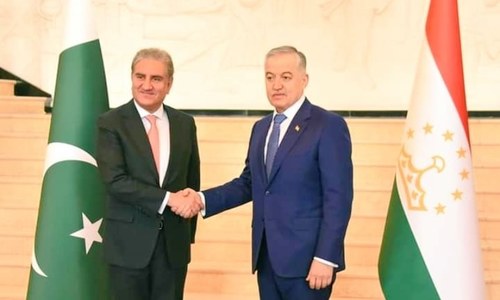ISLAMABAD: Foreign Minister Shah Mahmood Qureshi on Saturday urged Asian countries to renew focus on geo-economics and underlined the need for promotion of a rules-based global order.
He was participating in a high-level panel discussion on regional cooperation in Asia along with foreign ministers of Kyrgyzstan, Malaysia, Tajikistan and Uzbekistan under the Antalya Diplomacy Forum of Turkey.
Mr Qureshi highlighted the challenges being faced by Asian countries in the form of unresolved disputes, tensions from within and without, renewed arms race, containment policies, unilateralism, poverty, Covid-19 pandemic and climate change.
The foreign minister is currently on an official visit to Turkey to participate in the Antalya Diplomacy Forum, for which several global leaders and diplomats have gathered for discussion on important issues. The theme of the forum is “Innovative Diplomacy: New Era, New Approaches”, according to a press release issued by spokesperson for the Foreign Office.
In his remarks, Mr Qureshi drew attention to the possibilities of cooperation between countries in Asia. He said that connectivity and greater regional integration in terms of trade and investment would pave the way to what he called a “successful Asian century”.
Qureshi sees a disconnect between pullout of foreign troops from Afghanistan and the peace process
He noted that the China-Pakistan Economic Corridor (CPEC), a flagship project of the Belt and Road Initiative, offered great opportunities for the countries of the region.
The foreign minister described the three pillars of Pakistan’s policy as “regional connectivity, development partnerships, and peace and prosperity”.
During the discussion, the foreign ministers on the panel called for increased multilateralism to deal with the challenges faced by Asia and agreed on the need for a renewed focus on transit and connectivity projects in the region.
Earlier, talking to Turkish broadcaster TRT, Mr Qureshi said that Pakistan was keen to see both the Afghan peace process and the withdrawal of foreign troops from Afghanistan advancing in tandem, but in fact there was a disconnect between the two.
Pakistan, he said, had called for a responsible withdrawal from Afghanistan and also stressed the need for the peace process to continue side by side. “What I am seeing is that the withdrawal is taking place at a fairly rapid pace but peace process is moving ahead at snail’s pace. And that is a bit disconnect over there. And that is of concern to me,” Mr Qureshi said.
He said he was concerned over the rising level of violence in Afghanistan, which was not just linked to Taliban but also the militant Islamic State (IS) group and other spoilers within Afghanistan.
“They have their own designs and motives. This is a complicated situation. There are internal struggles going on within Afghanistan,” the minister said.
He said other disputes like the Jammu and Kashmir question were also impeding economic progress and integration in the region.
Mr Qureshi was of the view that the world was increasingly getting embroiled in competition and confrontation and people were being forced to take sides.
Mr Qureshi met his Iranian counterpart Javad Zarif on the sidelines of the Antalya Diplomacy Forum on Friday.
According to the Foreign Office, he congratulated Mr Zarif on the successful conclusion of the presidential elections in Iran and extended best wishes to the government and people of Iran.
While reviewing bilateral relations, the two foreign ministers noted “the positive trajectory” in ties in the last few years, according to the FO.
Published in Dawn, June 20th, 2021














































